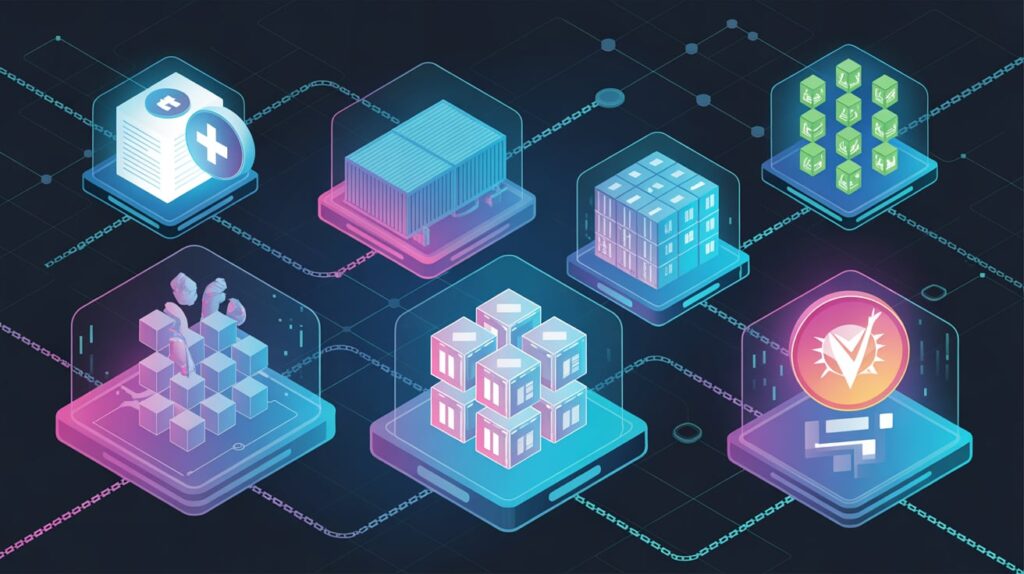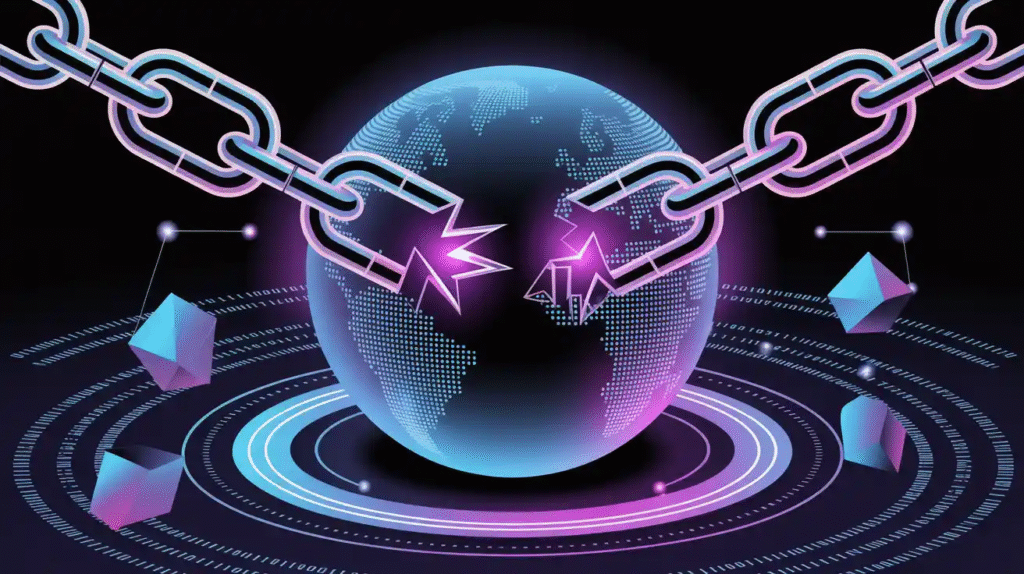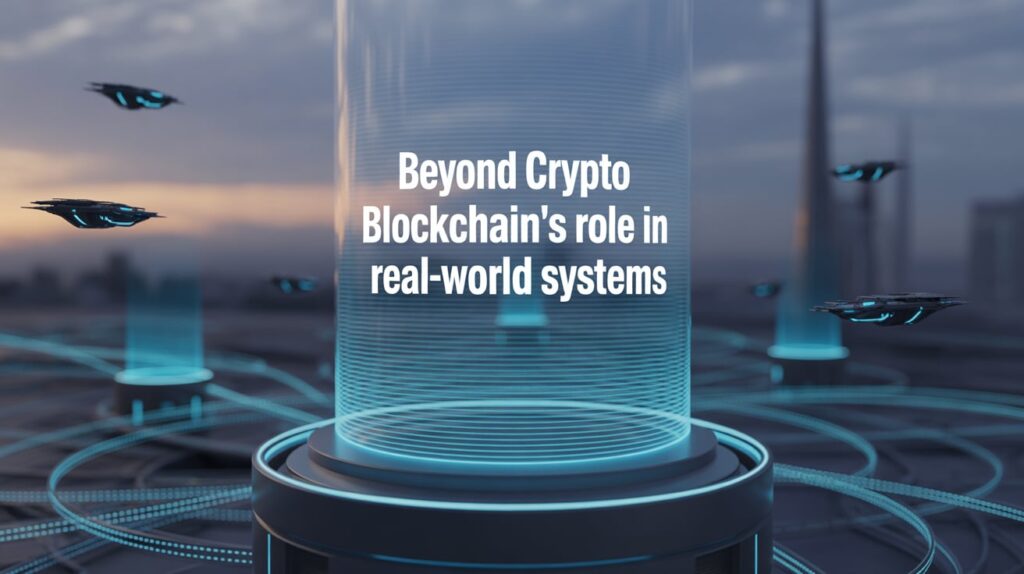For most people, when they hear the word blockchain, they think about Bitcoin or Ethereum or some other digital coin. That’s natural, because crypto is the first time blockchain entered mainstream talks. But blockchain is way bigger than just coins. In reality, blockchain applications have spread into business, healthcare, government, supply chains and even education. It is building a backbone of trust in digital systems.
The truth is blockchain at its core is just a distributed ledger. That means data is stored not in one central server but across a network of computers. This idea may sound simple, but it is actually very powerful because it removes the need of a middleman and creates security and transparency. Let’s break down how real-world industries are using blockchain beyond crypto.
Blockchain in Business Operations
Decentralized Systems Improving Efficiency
In business world, data and processes usually stay trapped in centralized servers owned by big corporations. This creates risk. If the central server get hacked or go down, entire system is compromised. Blockchain solve this by building decentralized systems where no single point of failure exist. For example, companies can share records across multiple branches without worrying about fake entries.
Small businesses are also starting to adopt blockchain in supply chain operations. Imagine a coffee company that want to prove to customers their beans are fair trade. With blockchain, every step from farmer to shipping to roasting can be recorded. Customers then scan a QR code and see full history. This builds trust and brand loyalty.
Secure Transactions Without Middlemen
Normally, businesses rely on banks or payment processors for transactions. Each step cost money and time. With blockchain, secure transactions can happen directly between two parties. Smart contracts make it even better. A smart contract is like a digital agreement that auto-executes when conditions are met. For example, a supplier delivers goods and instantly receives payment once delivery is confirmed on the blockchain. No delays, no extra fees.
This type of secure transaction not only cut costs but also reduce fraud risk. Because once a transaction is recorded on blockchain, it cannot be erased or changed. That level of trust is something traditional systems struggle to offer.
Resource Management With Distributed Ledger
Companies spend huge money on resource management. Tracking raw materials, energy usage, product shipments… it gets complicated. Using a distributed ledger, businesses can record every movement in real time. This make it easier to identify waste, theft, or inefficiency. For example, shipping companies already using blockchain to monitor containers. If one container is delayed or tampered, system flags it instantly.
This also help in compliance. Governments want proof that businesses follow environmental rules or labor standards. Blockchain provide auditable trail without endless paperwork.
Blockchain in Digital Identity and Security
Digital Identity for Individuals
One of the most exciting blockchain applications is digital identity. Right now, identity is spread across passports, ID cards, online accounts, and social security numbers. Losing them or getting hacked can ruin a person’s life. Blockchain make it possible for individuals to own a single digital identity stored safely on decentralized systems.
With this, people can log in to different services without creating new passwords each time. They simply prove their identity through blockchain keys. It gives control back to users, instead of big companies storing your personal info.
Protecting Data With Secure Transactions
In today’s digital world, data is like gold. But leaks and hacks are daily news. Blockchain can improve security by making it nearly impossible to alter data without detection. Hospitals, for example, store patient records on blockchain so no one can secretly edit or steal them. When a doctor access a file, blockchain records that action. Patients know exactly who saw their data.
Banks too are adopting blockchain-based verification to secure customer accounts. Since every login attempt can be recorded on distributed ledger, fraud becomes harder to hide.
Building Trust Across Borders
In global digital trade, trust is often missing. A company in one country may hesitate to deal with another far away. Blockchain help build trust because every transaction or data exchange is transparent and permanent. Digital identity combined with secure blockchain verification allow businesses and individuals to work together even if they never meet.
For refugees or people in regions with weak government ID systems, blockchain-based identity can also provide access to banking and education which was impossible before.
Blockchain in Supply Chains and Industries
Transparency in Supply Chains
Supply chain fraud is a big problem. Fake medicines, fake parts, food contamination, all these issues cost billions. With blockchain, every product can be tagged and tracked from origin to final customer. For example, diamond companies use blockchain to prove stones are not “blood diamonds.” Food companies trace products to farms to ensure safety.
Customers like this transparency because it make them feel safe. For businesses, it reduce lawsuits and recalls. This is why many industries are shifting to blockchain in supply chains.
Reducing Costs in Manufacturing
Manufacturing involve many suppliers and contractors. Miscommunication often cause delays or waste. Blockchain create one shared truth. If a part is shipped late, everyone in the chain sees it immediately. Payments are also faster through smart contracts. This reduce holding costs and improve efficiency.
Airplane manufacturers already using blockchain to track parts. Since planes require thousands of small components, blockchain helps verify authenticity and avoid fake parts entering supply chain.
Better Compliance and Auditing
Industries face strict audits from governments. Traditional auditing take weeks of paperwork. With blockchain, auditing can be real-time. For example, energy companies prove renewable sources usage instantly by showing blockchain records.
This not only reduce costs but also increase trust between companies and regulators. In industries like healthcare and pharma, this compliance transparency saves lives by ensuring only approved drugs reach market.
Blockchain in Public Services and Future Potential
Government Services and Voting
Governments also exploring blockchain in business and services. Land registries in countries like Estonia and Georgia already use blockchain. Instead of piles of paper, property ownership is recorded on blockchain. This stop corruption and fake land deals.
Even voting systems are being tested on blockchain. The idea is simple: each vote is a secure transaction recorded on distributed ledger. Voters can check their vote was counted, but nobody can change it later. This could make elections more trustworthy.
Education and Credential Verification
Universities face issue of fake degrees and certificates. Blockchain solve this by recording degrees on blockchain. Employers can verify instantly if a diploma is real. This protect both job seekers and companies.
Even online learning platforms use blockchain to certify skills. It make education credentials portable across countries and systems.
Future of Blockchain Beyond Crypto
Looking forward, blockchain may power Internet of Things (IoT). Imagine cars that pay tolls automatically using blockchain, or smart homes paying energy bills directly. Combined with AI, blockchain could handle global data systems with efficiency and trust.
One day, your medical records, your financial identity, even your job contracts could all run on blockchain. This would remove dependency on centralized tech giants and give control back to users.
Conclusion
Blockchain is no longer just about crypto. Its applications are spreading across industries and daily life. From decentralized systems in businesses to digital identity protection, from supply chain transparency to secure transactions, and even into government and education, blockchain is reshaping trust and efficiency everywhere.
The common thread is simple. Wherever there is need for security, transparency, or removal of middlemen, blockchain can provide the answer.
Adoption is still growing, but signs are clear. In the next decade, blockchain applications will become as common as internet itself. Companies and governments that adapt early will save costs, improve trust, and build stronger connections with people.
For now, the journey continues, and what started as just crypto is transforming into something much bigger, something that may become foundation of the digital future.




